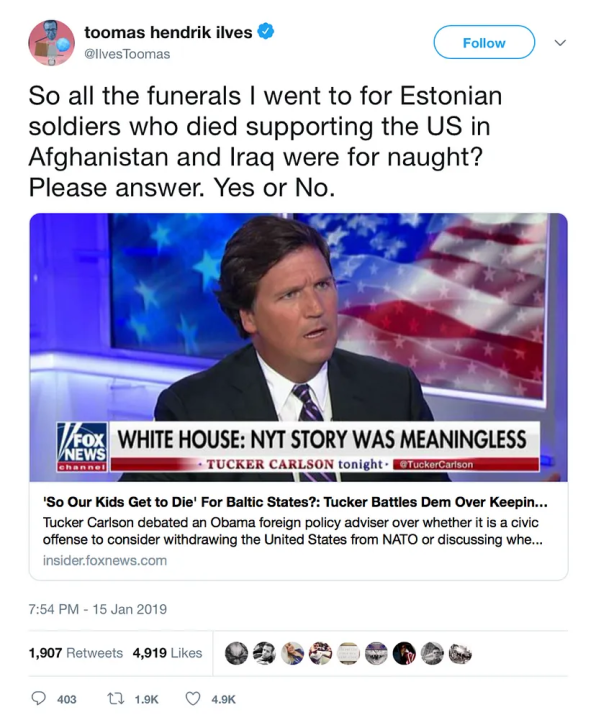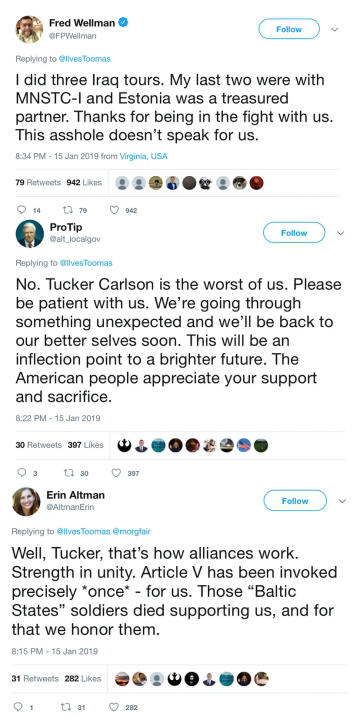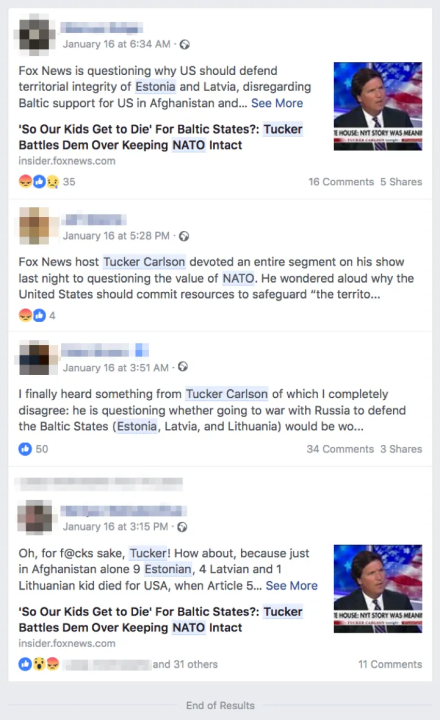#BalticBrief: Pro-Kremlin Media Weaponize Tucker Carlson Claim
Pro-Kremlin media uses U.S. media bias to suggest a broader lack of U.S. commitment to NATO
#BalticBrief: Pro-Kremlin Media Weaponize Tucker Carlson Claim

BANNER: (Source:@nikaaleksejeva/DFRLab via Fox News/archive)
Pro-Kremlin media spread biased and hyperbolic narratives after Fox News host Tucker Carlson questioned the United States’ obligation under NATO’s Article Five to guard the Baltic states from armed aggression, concluding on the basis of his comments that the U.S. is unwilling to defend its allies. This case further demonstrates how pro-Kremlin media endeavor to convince their viewers that an isolated comment represents a larger trend across society, especially when it comes from a prominent commentator in the United States.
The DFRLab analyzed social media and open-source conversations about Tucker Carlson, host of “Tucker Carlson Tonight” on Fox News, saying “our kids get to die for Latvia, because it somehow protects the rule of law to do that.”
Most of the Twitter, Facebook, and Reddit accounts that commented on Carlson’s claim criticized the idea of a U.S. withdrawal from NATO and reassured their allies of their commitment to collective defense. A week after his comments, on January 22, the U.S. House of Representatives approved legislation aimed at preventing Trump from withdrawing the United States from NATO by a clear bipartisan majority (357–22).
Pro-Kremlin and fringe Russian-language media, however, claimed that Carlson’s opinion proved that the United States had abandoned its NATO commitment to the Baltics.
Tucker Carlson’s Anti-NATO Remarks
On January 14, 2019, The New York Times published an investigation that suggested that “several times over the course of 2018, [U.S. President Donald] Trump privately said he wanted to withdraw from the North Atlantic Treaty Organization (NATO).” The following day, Tucker Carlson questioned U.S. membership in NATO during his show on Fox News, asking former Obama foreign policy adviser David Tafuri why the United States should continue to commit major resources to protect countries like Estonia and Latvia.
During the show, Carlson questioned Article Five of the North Atlantic Treaty, which obligates a response from all NATO members on the basis of collective defense. He said:
That’s what we’d be obligated to do. In other words, our kids get to die for Latvia, because it somehow protects the rule of law to do that. Does the average American know we’re on the hook for this?
Former President of Estonia Toomas Hendrik Ilves reacted to what Carlson said in a tweet that highlighted his country’s assistance with the U.S. missions in Afghanistan and Iraq.

The tweet generated 4,919 likes, 1,907 retweets, and 403 responses. In most responses, Twitter accounts thanked Estonia for the soldiers it sacrificed for the U.S. campaigns and contradicted Carlson.

Most of the Twitter accounts that tweeted about Carlson’s statements shared the same sentiment as accounts who replied to Ilves’ tweet. The top eight most retweeted tweets in the United States, according to Sysomos, criticized what Carlson said and thanked soldiers from smaller NATO member states for their sacrifices. Three of the tweets shared a link to a Twitchy article that linked to Ilves’ tweet.

TThe DFRLab identified similar sentiments on Facebook. All four public Facebook posts that appeared in search results for keywords “Tucker Carlson NATO Estonia” did not agree with Carlson’s statements.

The DFRLab managed to identify just two posts on Reddit Carlson’s comments on NATO. The Twitchy article about Ilves’ response was posted on r/Right_Wing_Politics subreddit and got just one response in the form of a question asking if supporting small allies is a burden to the United States.

The DFRLab could not identify significant discussion on social media that supported what Carlson said about U.S. membership in NATO.
Local Coverage in the Baltic States
Carlson’s statements on NATO also reached Estonia and Latvia. Major media outlets and local Sputnik chapters reported about the show in local languages.
In Latvia, four media outlets, including Sputnik in Latvian published stories about Carlson’s show and Ilves’ reply to it. Sputnik, Delfi.lv, and TVNet.lv all provided the same factual reporting in a neutral tone. Jauns.lv focused on Twitter conversation. All four media outlets mentioned that U.S. President Donald Trump has previously expressed a willingness to leave NATO.
In Estonia, the two biggest online media outlets, Postimees.ee and Delfi.ee, summarized the debate between Carlson and Tafuri and mentioned Ilves’ tweet at the end. EER.ee, the online media platform for Estonia’s public broadcaster, added that Fox News influences Trump’s voters and Trump himself. Sputnik Estonia adapted an article published by the Kremlin-owned news agency RIA Novosti titled “Estonians Finally Get It: Americans Will Not Die for Us.”
Pro-Kremlin Media Misrepresents the Story
The DFRLab identified four fringe and three mainstream media outlets that covered what Carlson said during his show. In most of the cases, the articles covered what Carlson said and generalized it as the opinion of many Americans without presenting counterarguments by Tafuri or evidence that it is actually the opinion of “many.”
Fringe media outlet Replyua.net wrote:
Many American experts realized that some countries, the Baltic states in particular, were deliberately escalating the political situation in order to receive military assistance in the form of weapons or money.
Pravda-TV.ru, also a fringe media outlet, wrote:
The Baltic states, which have always adhered to the pro-Western position, were very lucidly shown their place by naming Estonia and Latvia in the list of countries that are not worth the life of an American soldier. However, even after such blatant disregard, which, by the way, was not the first time, the Baltic states would not change their policy.
Fringe media outlet Avia.pro attacked Ilves for his tweet, writing:
In fact, such a question from Ilves falls into the category of strange. Who else, if not him, involved the country in the U.S. military adventure with the alliance in Afghanistan? Why would he not remember how he spoke about his country’s contribution to the Afghan war as a contribution “to his own security” when he met the last Estonian soldiers returning from Afghanistan in 2014?
None of the media outlets mentioned above named the authors or the sources for their claims. Neither of the three articles garnered any traction according to online content research tool Buzzsumo. On VKontakte (VK), a Russian social-media platform similar to Facebook, the DFRLab identified two shares of the Replyua.net article, one share of the Pravda-TV.ru article, and no shares of the Avia.pro article.
The opinion piece by Vladimir Kornilov, a political commentator from Donetsk, originally published by RIA Novosti and translated by Sputnik Estonia reached a wider audience. In the piece, Kornilov made many editorial statements that misconstrued how the debate between Carlson and Tafuri went as well as Ilves’s reaction. He wrote:
Somewhat confused by such pressure, Tafuri muttered: “NATO has proved its success in the past by defeating the Soviet Union.” But Carlson, anyway, continued to tick off from Tafuri the answer to the question “why should American children die for Latvia?” [..] Former Estonian President Thomas Hendrik Ilves erupted with an indignant, pretentious tweet: “So all the funerals I went to for Estonian soldiers who died supporting the US in Afghanistan and Iraq were for naught? Please answer. Yes or No.” When many of the readers of the ex-President began to honestly confirm the senselessness of the victims of the Estonian military, he began to ban them.
The DFRLab read all the comments and identified just 26 responses that did not support what Ilves said in his tweet and one conversation in which a Twitter account claimed Ilves banned him.
In the article, Kornilov argued that the deaths of Estonian soldiers in Afghanistan were worthless, because Afghanistan is still a failed and insecure state.
At the end of the article, he generalized Carlson’s statement that Americans do not want to die for the Baltic states. He wrote:
Now, across the ocean, they once again make it unambiguously clear to the Baltic states: America does not want to sacrifice its military for the sake of the interests of small states in Eastern Europe. And they, as if not noticing these signals, continue to dream aloud the fifth article of the NATO Treaty.
Kornilov’s opinion piece spread across other Russian-language media outlets including Sputnik Latvia and Sputnik Lithuania. In Lithuania, it was republished on a web page for a Russian citizen association in Klaipeda.

According to the DFRLab’s media spread analysis, fringe media outlets got Kornilov’s piece either from RIA Novosti or Rambler, which republished it the same day.
RuBaltic.ru, a pro-Kremlin media outlet reporting on the Baltic states, published another opinion piece based on the Carlson’s show. Its author, Alexander Nosovich, suggested that “it has become a norm to refuse the Baltic states military support.”

In the article, Nosovich summarized Carlson’s comments and ignored Tafuri’s counterarguments, instead listing other cases when someone has expressed doubts on the U.S. membership in NATO and its requirement to support the Baltic states.
He mentioned a Forbes opinion piece from 2015 by Doug Bandow, a political columnist with conservative think tank the CATO Institute who later resigned after it was revealed that he had accepted payments in exchange for publishing favorable articles about his clients. His pieces suggest he is against any U.S. military intervention abroad.
Nosovich reminded that, while on campaign in 2016, now-U.S. President Trump said he will decide whether to come to the Baltic states’ aid in the event of a Russian attack only after reviewing if those nations have “fulfilled their obligations to [the United States].”
Nosovich also mentioned that, during a CBS News interview, Newt Gingrich, a top Trump supporter and former Speaker of the U.S. House of Representatives, referred to Estonia as being “in the suburbs of St. Petersburg” and hypothesized that he was not sure he “would risk a nuclear war over some place which is the suburbs of St. Petersburg.”
Nosovich did not provide any counterarguments by those Americans that support U.S. membership in NATO. Instead, based on those three cases only, he concluded that the idea of the United States not supporting the Baltic states has become a norm in the United States, that the Overton Window has shifted, and that the Baltic states are now used to it.
The RuBaltica.ru article garnered 759 shares on social media and was republished by pro-Kremlin media outlet Vesti.lv in Latvia, which itself garnered 566 more shares on social media, according to Buzzsumo. The title on Vesti.lv read: “A Journalist: Let Latvians Get Salt and Bread and Wait for Russian Tanks with Flowers.” Two fringe Russian-language media outlets Politikus.ru and Starklive.ru also republished Nosovich’s article.
Russian news agency RIAFAN that has been added to the U.S. sanctions list based on its connections with Concord Management, a company that meddled in the 2016 U.S. elections. RIAFAN also provided an expert opinion on what Carlson said during the show. It cited Vladimir Bruter, a pro-Kremlin expert on international politics, saying that this is how a large part of Americans think, because many do not know what the Baltic states are. The article did not garner significant traction.
Conclusion
Most of the U.S. Twitter users who engaged with Tucker Carlson’s comments on Fox News and former Estonian President Toomas Hendrik Ilves’s reply took the latter’s side and disregarded Carlson’s opinion as marginal. The DFRLab identified 26 Twitter replies and one Twitter conversation that did not agree with what Ilves said and one account that Ilves supposedly banned. Unlike the Kremlin media, the DFRLab cannot draw broad conclusions about overall public sentiment based off of a limited example: while the tweets identified were pro-NATO, they do not necessarily represent the broader public’s thinking.
The DFRLab did not find any support for Carlson’s comments on Facebook nor Reddit.
Balanced factual reporting about the debate on Fox News and Ilves’ reply dominated in Estonian- and Latvian-language media.
Biased and generalized reporting full of editorial statements, however, dominated the Russian-language information space. Though the original reporting came from media outlets that operate in the Russian media market, Kremlin and pro-Kremlin media outlets republished some articles, likely reaching the Russian-speaking population in the Baltic states in the process.
Follow along for more in-depth analysis from our #DigitalSherlocks.

